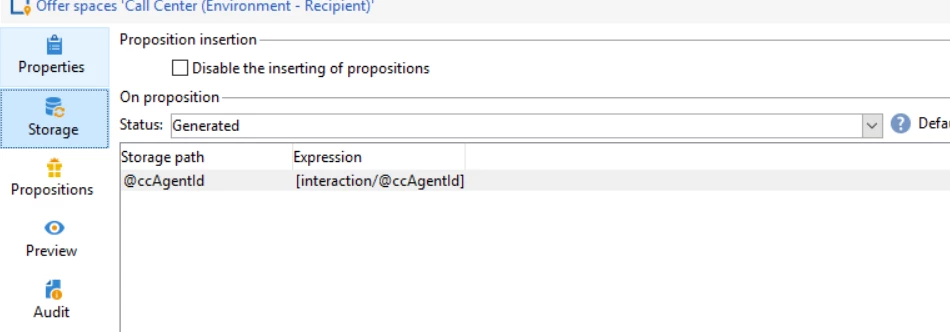Interaction extension attribute is not saved
I am extending the interaction schema to add a new attribute called ccAgentId to store the call center agent id. While making SOAP call, the call center application will send the string agent Id.
So I started following the instructions as mentioned into the document Extension example
After making the changes in interaction and proposition schema, I updated the offer space as below to store the ccAgentId sent via the propose method

I am making the call and passing the attribute as below. But the extension value is not getting saved into the proposition schema (proposition is saved but the extension column is blank).
<urn:context>
<!--You may enter ANY elements at this point-->
<context>
<interaction ccAgentId="TarunG" />
</context>
</urn:context>
I have the interactiond process running on the instance. I really don't know what this process actually does other than some very high level info I saw in the documentation. A side question, is this even required to run if I have just one instance (control instance) running? Also if I have multiple servers, do I need to run it on all the servers? I don't have any separate execution instance as of now.
Coming back..
After further debugging the interaction.js and the code generated by offer space, I got the option variable NmsInteraction_UseDaemon
When you keep the variable = 1 (default), the "if" part is executed and when =0, then else part (below code)
sInsertOrder = this.buildInsertMem(propositionSchemaRoot, linkPropToTarget, this.sTargetSchema)
else
sInsertOrder = this.buildInsertSQL(propositionSchemaRoot, linkPropToTarget, this.sTargetSchema)
Now, the first part of the if creates the code as below which has the part of ccAgentId as highlighted.
interactionInsertProp(propositionId, id, 21043, props[0].id, iDeliveryId, proposition.weight, proposition.rank, proposition.status, String(ctx.@['id']).replace(/\\/g, '\\\\').replace(/:/g, '\\:'), (index == iLen-1 ? aNextOffers.join(",") : ""), (index == iLen-1 ? aNextOffersWeights.join(",") : ""), "sCcAgentId,6," + String(ctx['interaction']['@ccAgentId']), (index == iLen-1 ? sTotalTime : 0), (index == iLen-1 ? sInitHookTime : 0), (index == iLen-1 ? sSessionCookieTime : 0), (index == iLen-1 ? sPermCookieTime : 0), (index == iLen-1 ? sTargetLoadTime : 0), (index == iLen-1 ? sVisitorLoadTime : 0),(index == iLen-1 ? sTargetLoadHookTime : 0), (index == iLen-1 ? sExistsRulesTime : 0), (index == iLen-1 ? sPropHookTime : 0), (index == iLen-1 ? sMicroEngineHookTime : 0), (index == iLen-1 ? sPostPropProcessTime : 0), (index == iLen-1 ? sTypologyTime : 0));
For the else part, it creates a statement with sqlExecOnDataSource function to execute the sql directly into the database as below and it has the part for ccAgentId too.
sqlExecOnDataSource("insert into NmsPropositionRcp (iPropositionId,iOfferId,iOfferSpaceId,iInteractionId,dWeight,iRank,iStatus,tsEvent,tsLastModified,iEngineType,iDeliveryId,iRecipientId,sCcAgentId) values ($(l),$(l),21043,$(l),$(d),$(l),$(b),$(curdate),$(curdate),1,$(l),$(l),$(sz))", "default", propositionId, id, props[0].id, proposition.weight, proposition.rank, proposition.status, iDeliveryId,ctx.@['id'], String(ctx['interaction']['@ccAgentId']));
Now the confusing part is, when the option variable is set to 0 (default one), the ccAgentId is not saved where as when option var = 1, it is saved properly.
That means, with the direct SQL, it is working fine whereas the asynchronous processing is not saving the data. I fear, if I do the synchronous insert statement, I will have trouble when Millions of calls will come in an hour as everyone will try to lock the table for insert/update [Same details I notices for Update method as well].
Can someone please help me to understand what is happening inside and how can I have it working with default value for the option variable.